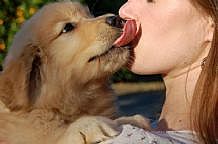 We hear about dog owners verify their dogs’ love of them through the kisses delivered upon them when they return home. These “kisses” are licks: slobbery licks to the face; focused, exhaustive licking of the hand; solemn tongue-polishing of a limb. I confess that I treat the licks that my dog Pump bestows on me as signs of affection. “Affection” and “love” are not just the recent constructs of a society that treats pets as little people, to be shod in shoes in bad weather, dressed up for Halloween, and indulged with spa days. Before there was any such thing as doggy day care, Charles Darwin himself wrote of receiving lick-kisses from his dogs. He was certain of their meaning: Dogs have, he wrote, a “striking way of exhibiting their affection, namely, by licking the hands or faces of their masters.” Was Darwin right? The kisses feel affectionate to me, but are they gestures of affection to the dog?
We hear about dog owners verify their dogs’ love of them through the kisses delivered upon them when they return home. These “kisses” are licks: slobbery licks to the face; focused, exhaustive licking of the hand; solemn tongue-polishing of a limb. I confess that I treat the licks that my dog Pump bestows on me as signs of affection. “Affection” and “love” are not just the recent constructs of a society that treats pets as little people, to be shod in shoes in bad weather, dressed up for Halloween, and indulged with spa days. Before there was any such thing as doggy day care, Charles Darwin himself wrote of receiving lick-kisses from his dogs. He was certain of their meaning: Dogs have, he wrote, a “striking way of exhibiting their affection, namely, by licking the hands or faces of their masters.” Was Darwin right? The kisses feel affectionate to me, but are they gestures of affection to the dog?
First, the bad news: Researchers of wild canids—wolves, coyotes, foxes, and other wild dogs—report that puppies lick the face and muzzle of their mother when she returns from a hunt to her den, in order to get her to regurgitate for them. Licking around the mouth seems to be the cue that stimulates her to vomit up some nicely partially digested meat. How disappointed Pump must be that not a single time have I regurgitated half-eaten rabbit flesh for her.
Furthermore, our mouths taste great to dogs. Like wolves and humans, dogs have taste receptors for salty, sweet, bitter, sour, and even umami, the earthy, mushroomy-seaweedy flavor captured in the flavor-heightening monosodium glutamate. Eventually I realized that Pump’s licks to my face often correlated with my face having just overseen the ingestion of a good amount of food.
Now the good news: As a result of this functional use of mouth licking—“kisses” to you and me—the behavior has become a ritualized greeting. In other words, it no longer serves only the function of asking for food; now it is used to say hello. Dogs and wolves muzzle-lick simply to welcome another dog back home, and to get an olfactory report of where the homecomer has been or what he has done. Familiar dogs may exchange licks when meeting at their ends of their respective leashes on the street. It may serve as a way to confirm, through smell, that this dog storming toward them is who they think he is. Since these “greeting licks” are often accompanied by wagging tails, mouths opened playfully, and general excitement, it is not a stretch to say that the licks are a way to express happiness that you have returned.

Never understood the attraction of being face- or mouth-licked by a dog who has just rolled around in a dead animal carcass, then licked it’s fur, picked up a dead squirrel, rolled in some old lawn mines, stuck it’s runny nose up another dog’s tailpipe, and then licked it’s south end after a rest stop.
Yeah, I can’t see the excitement either, especially since dogs like to eat crap from a carnivore–like watching my wife’s dog eat the cat’s crap.
Having seen my dogs munching on their own vomit and horse turds, I think I’ll pass on the licking…
Does Gus lick you Jonco?
Gus doesn’t lick much at all… and never your face.
my dog would rather drink from the toilet than her water dish, I lover her and all, but ya know, I’d rather not have her “kiss” me after a good long drink of toilet water.
love her oops
About 4 years ago, I had a coworker who loved to kiss the dog every time the animal went into the warehouse were we used to work. No matter how many times I explained him how dogs lick their b*lls, eat their vomit and all sorts of nasty stuff, he kept doing it. And this far, he has never been sick of bacterial infections or something for that matter.
Maybe dogs don’t carry that kind of disease in their saliva. Who knows. However, I’d rather stay away from dog kisses.
I love my dog to kiss me, and yes he licks himself to clean and sniffs butts but not ALL dogs eat poop or dead animals. I really don’t care if anyone thinks its gross, I don’t and I love my baby dog. You people are not true dog people!